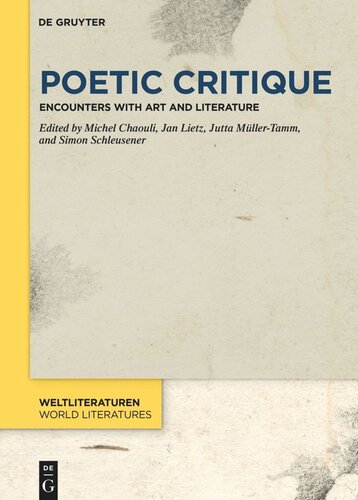

Most ebook files are in PDF format, so you can easily read them using various software such as Foxit Reader or directly on the Google Chrome browser.
Some ebook files are released by publishers in other formats such as .awz, .mobi, .epub, .fb2, etc. You may need to install specific software to read these formats on mobile/PC, such as Calibre.
Please read the tutorial at this link: https://ebookbell.com/faq
We offer FREE conversion to the popular formats you request; however, this may take some time. Therefore, right after payment, please email us, and we will try to provide the service as quickly as possible.
For some exceptional file formats or broken links (if any), please refrain from opening any disputes. Instead, email us first, and we will try to assist within a maximum of 6 hours.
EbookBell Team

4.4
92 reviewsPoetic critique – is that not an oxymoron? Do these two forms of behavior, the poetic and the critical, not pull in different, even opposite, directions? For many scholars working in the humanities today, they largely do, but that has not always been the case. Friedrich Schlegel, for one, believed that critique worthy of its name must itself be poetic. Only then would it stand a chance of responding adequately to the work of art.
Taking Schlegel’s idea of poetische Kritik as a starting point, this volume reflects on the possibility of drawing these alleged opposites closer together. In light of current debates about the legacy of critique, it investigates whether a concept such as poetic critique (or poetic criticism) lends itself to enriching our intellectual practice by engaging with the poetic potential of criticism and the critical value of art and literature.